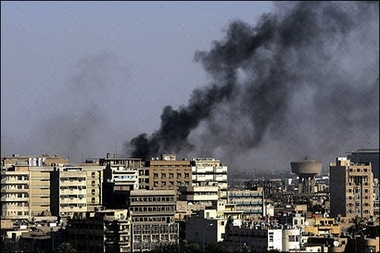Iraq allies urge Bush to turn to Iran, Syria
(Reuters)Updated: 2006-11-14 07:38
WASHINGTON - US President George W. Bush, searching for a new approach in Iraq, expressed little enthusiasm on Monday for seeking Syrian and Iranian help to calm Iraq as he also cautioned Democrats against quick US troop reductions.
|
|
Unrelenting violence in Iraq has added to the pressure on Bush. Through Monday night, Baghdad reported one of the highest tolls of suspected sectarian deaths in recent weeks, with the bodies of 46 people recovered, an Interior Ministry source said. A suicide bomb killed 11 Iraqis on a minibus and at least nine US and British troops were reported killed in the previous two days.
Monday's violence, which also underlined Prime Minister Nuri al-Maliki's problems trying to curb the bloodshed, followed attacks which killed more than 100 people Sunday including a suicide attack on police recruits which killed 35 in Baghdad.
British Prime Minister Tony Blair was to call on Monday for Syria and Iran to be engaged in efforts to stem violence in Iraq and to secure a broader Middle East peace settlement.
Blair will argue the need for a Middle East strategy that includes making clear to Damascus and Tehran how they can help in the region while warning them of the consequences of hindering peace, a spokeswoman said.
Prime Minister John Howard of Australia, another of Bush's loyal backers in Iraq, also said Monday talks should be held with Syria and Iran on ending the violence in Iraq.
It is not clear how willing Tehran and Damascus are to step into the turmoil of Iraq to aid Washington.
DEMOCRAT CALLS FOR TROOP CUTS
Iran and Syria's possible role was one of the ideas also thought to be under discussion in the Iraq Study Group led by former Secretary of State James Baker, a Republican with close ties to the Bush family, and former Democratic Rep. Lee Hamilton of Indiana.
Speaking to reporters at the White House, Bush remained cool to such a move, saying Syria needed to get out of Lebanon and Iran needed to abandon its nuclear ambitions.
He pointed out that the United States had offered direct talks with Iran about its nuclear ambitions if Tehran would agree to stop uranium enrichment, which Iran has refused.
Sen. Carl Levin, a Michigan Democrat who will chair the Senate Armed Services Committee, said he had spoken to Republicans and thought there would be bipartisan support for a resolution urging a change of course in Iraq.
| 1 | 2 |  |
|
||
|
||
|
|

